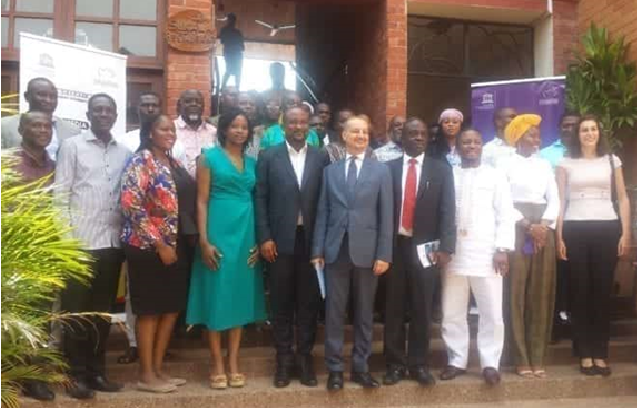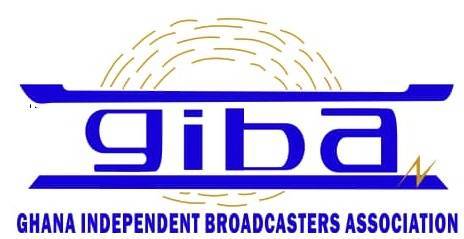- November 18, 2019
- Posted by: emblisha
- Category: News

According to Dr. Roland Affail Monney, President of the Ghana Journalists Association, “migration has assumed significant importance as its potential for economic and social development is increasingly acknowledged in the global agenda.
The Ghanaian media therefore has a crucial role to play in the promotion of safe, secure internal and international migration.
However, many Ghanaian journalists are unable to adequately cover and accurately report on migration issues which has resulted in the gradual erosion of public confidence in their ability to provide trusted information and the knowledge necessary for promoting migrants’ rights safer migration practices and informing the destination choices of regular migrants.
The inadequate knowledge and understanding of national and international frameworks for migration among frontline Journalists and field correspondents, coupled with misperceptions of migrants among the populace are some of the weaknesses that underlie this challenge.
In response to this challenge, the ‘Media Training and Public Sensitization on ECOWAS and Migrants’ Rights’ project was initiated. The project was jointly funded by the ECOWAS Commission and
European Union with technical support from the International Organization for Migration (IOM) and implemented in Ghana by Media Response together with its collaborative partners the Ghana News Agency (GNA), Ghana Journalists Association (GJN), Information Services Department (ISD) and the Ghana Independent Broadcasters Association (GIBA).
As part of the project’s activities, training workshops were held for selected journalists in four regions of Ghana, Greater Accra, Western, Ashanti and Northern regions.
The training workshops covered areas such as ethics of investigative journalism on free movement and migration, the connection between migration and development and data sources for migration reporting among others.
It also equipped participants with practical skills in the design and implementation of public awareness campaigns on migration using various new media tools to reach a wider audience.
This manual is a compilation of the various knowledge materials derived out of the training workshops together with the key recommendations of the lessons learnt workshops conducted in the four project regions.”
For effective public education and sensitization programmes that can positively contribute towards the promotion of safer migration practices and the protection of migrants’ rights in Ghana and beyond, the Ghana Independent Broadcasters’ Association (GIBA) in collaboration with UNESCO organized a one-day training for editors on migration.
Dubbed, “Empowering young people in Africa through media and communication”, the training happens to be the first in its series, and aimed to keenly look into the challenges of the increasing spate of irregular migration Africa. However, under the “Fondo Africa” three-year project, it’s being sponsored by the Italian Government.
The Fondo Africa, is an institution seeking to support and revive the cooperation between Italian Government and African countries and fight irregular immigration and human trafficking through campaigns on migration risks.

Held at the Coconut Groove Regency Hotel in Accra, on Wednesday November 13th, 2019, Deputy Minister for Information, Hon. Pius Enam Hadzide, in his address said, media practitioners can help enhance accountability, by facilitating dialogue between decision-makers and the rest of society, and as well as play a crucial role in improving the public’s understanding of current or emerging issues, events, priorities and policy pronouncements and options.
He said, “It is in the light of this that the aim of this workshop, Building the capacity of senior broadcast practitioners and editors on migration related reportage, experience sharing, and mapping out the way forward for effective reporting, becomes very relevant, as it is in sync with the government’s “Ghana Beyond Aid” agenda.
I commend the executives of GIBA and the organizers and I will urge that we continuously build the capacity of our membership in this and many other areas to enable them deliver on their mandate as the fourth estate of the realm.”
Mr. Enam Hadzide, indicated that,
building the capacity of senior journalists on migration related reportage, experience sharing, and mapping out the way forward for effective reporting
“I don’t think anybody will cross the Sahara and go through these rickety boats in the Mediterranean because they want to. They feel a certain compulsion to do so because at home, the opportunities that they’re looking for are not there – the statistics on Ghanaians intending and actually attempting to migrate is rather worrying”, he said.
He noted that, it behoves government to create an enabling environment that would ensure that migrants would see more opportunities in their countries of origin.
The Deputy Minister said, “We must all agree with H.E. The President when he states “I don’t think anybody will cross the Sahara and go through these rickety boats in the Mediterranean because they want to. They feel a certain compulsion to do so because at home, the opportunities that they’re looking for are not there,” Statistics on Ghanaians intending and actually attempting to migrate is rather worrying.
The President again states “We have a responsibility to our young people… to create the conditions that will make sure that they see opportunity in their own countries of birth and origin.” This is one of the pillars of the Ghana beyond Aid Vision.
We have a duty to discuss the challenges and problems. We also have a duty to highlight the solutions and let the people see the opportunities that are being created; free SHS, potential and growth of Agriculture, talking about planting for food and jobs, Light industrialization ( 1D1F). The Job Center of the YEA, etc, etc. This is important because too much negativity and pessimism has the tendency to drive the youth away even from the opportunities that are agreeably now being created. It is true that grass is getting greener at our end.”
Mr. Hadzide, also intimated that, “Recently, anti-migrant and xenophobic messages have permeated in several countries and resulted in a climate of marginalization, discrimination, and rising violence against migrants. The public narrative on migration is deeply polarized and often openly xenophobic.
Migrants have been made into scapegoats and associated with criminality, disease, unemployment and other social problems. It is an issue that raises strong, often visceral emotions. Migrants as well as the communities into which they arrive deserve better and more responsible political leadership.”

The Italian Ambassador to Ghana, Mr Giovanni Favilli, also in his address said the project is envisioned to help the media to be abreast with the issues of migration for accurate reportage.
Mr. Favilli, explained that, more often than not, the reports in the media about migration happens to be inaccurate and does not reflect on the reality. Cautioning, he said the media should avoid fake news.
He emphasized that, according to a research, when 70 percent of Ghanaians are given the chance, they would migrate, whilst 42 percent have the intension to migrate in the next five years, whereas others disguise themselves to seek asylum.
The Ambassador, therefore called on the media to balance the freedom they enjoy with their responsibility and give the right information to the public.
Adding that, Ghana and Italy would manage the situation which would be a win-win for both countries.

Ms. Melody Eklu Boateng, a National Professional Officer at the Natural Science Sector of UNESCO, speaking in stead of Mr. Abdourahmane Diallo, UNESCO representative to Ghana, noted that, the Project is concurrently being implemented in seven African countries including Cameroon, Cote d’Ivoire, Guinea, Mali, Niger, Nigeria and Senegal.
Ms. Boateng, said, according to the United Nations, annually, millions of Africans among whom are women, leave their homes in search of “better life”, and out of the 32 million African migrants scattered around the world, 9 million lives in Europe.
Disclosing that, the population growth in Africa would be impacted, accounting for 2.4 billion being half of the world’s population by 2050 and 4 billion in 2100.
This growth, she said, would greatly impact national education systems as well as the labour market, thus it would have to absorb an increasing number of unskilled young Africans who are unemployed.

Professor Kwame Karikari, who facilitated the event, charged the media to always highlight on irregular migration, what it’s involved and the cost to help save people from embarking on the perilous adventure.

Mr. Ernest Boateng, Vice President of the Ghana Independent Broadcasters’ Association (GIBA), said the project would also train editors in Kumasi, Tamale and Takoradi to improve their professional standards on migration reporting. He also disclosed that, the project was launched in January 2019 in Paris-France and adopted by Italy.
Source: newsghana.com.gh
